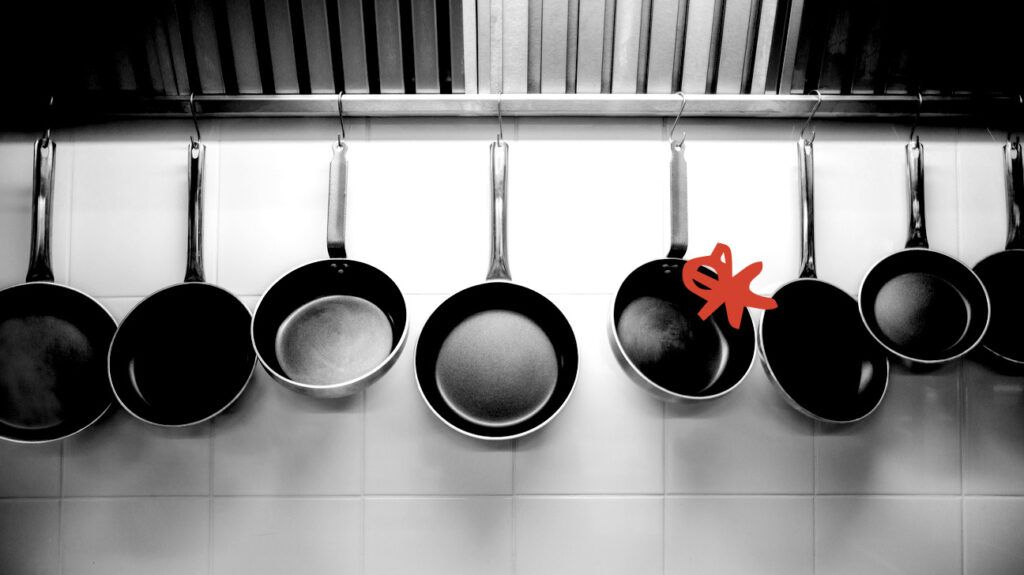Some people are concerned that nonstick coatings are harmful once they begin to degrade and shed plastic particles. While research partly supports this, it also shows nonstick cookware is likely safe when following precautions.
Nonstick pots, pans, and air fryers have become staples in many kitchens. A nonstick coating prevents food from sticking to the surface, making cooking and cleaning easy and reducing the need for oil or butter to prevent sticking. Nonstick cookware also distributes heat evenly, reducing hot and cool spots.
However, nonstick coatings are controversial, with many believing they can expose people to chemicals that may negatively affect health.
This article discusses the latest research into nonstick coatings, how to use nonstick cookware safely, and alternative options for people who wish to avoid it.

Most nonstick cookware has a polytetrafluoroethylene (PTFE) coating, a type of polymer or plastic commonly known as Teflon. This coating belongs to a group of chemicals called per- and polyfluoroalkyl substances (PFAS).
Many people are concerned that when PTFE gets scratched, microplastics or nanoplastics can enter food. Another concern is that heating PTFE at high temperatures or for a long time releases toxic particles into the air.
The consequences of this are unknown, but research suggests it may have negative health effects.
Recent research supports the idea that nonstick coatings can increase the plastic humans ingest. However, it is unclear how this can affect health.
A 2022 study used a special imaging technique called Raman spectroscopy to examine what happens to nonstick coating during cooking.
The researchers used metal and wooden utensils with both old and new nonstick cookware and found they all caused tiny abrasions to the coating, which released PTFE particles. These particles were microplastics and nanoplastics (MNPLs).
Studies have suggested that swallowing MNPLs may damage the respiratory tract, causing problems such as asthma, bronchitis, and fibrosis. However, more research is necessary to confirm their effects.
A 2023 study used computer modeling to show how PFAS, such as PTFE, may affect the balance of a person’s thyroid hormones. A healthy thyroid gland is essential for brain function and regulating the metabolism.
The study found that PFAS affect how thyroid hormone molecules bind together by causing rigidity in the binding region. More research is necessary to determine how much exposure to PFAS is necessary to negatively affect thyroid function.
A 2022 study in China examined the link between prenatal exposure to PFAS, thyroid hormones, and infant development. The researchers found that greater PFAS exposure in pregnancy affected motor skills in male infants, concluding that PFAS can have an effect on early neurodevelopment. The researchers suggested that thyroid hormones may play a role in this relationship.
A 2024 study describes an incident in northern Italy in which PFAS contaminated the water between 1980 and 2018, affecting around 150,000 people.
Researchers analyzed death data from those years and found higher mortality rates from cardiovascular diseases and certain cancers, such as kidney and testicular cancer, in the affected population. This study provides further evidence of the harmful effects of PFAS exposure on health.
Nonstick cookware is likely safe to use if people follow precautions.
A 2024 study tested six types of aluminum-based cookware coated in Teflon or granite, commonly known as ceramic-coated. The researchers performed various corrosion, abrasion, and mechanical tests, and heated the cookware to various temperatures for varying lengths of time.
The results showed that prolonged heating and temperatures higher than 250°C (482°F) affected the internal structures of all the cookware. Ceramic-coated cookware showed fewer signs of wear, suggesting that it is more resistant to wear than PTFE-coated cookware. Teflon-coated cookware was more likely to degrade and transfer plastic particles into food or air.
Based on the results, the researchers recommended using aluminum-based nonstick cookware below 250°C (482°F) for a maximum of 45 minutes.
It is important to avoid scratching nonstick cookware, as this increases the chance of plastics sticking to food or utensils. Metal utensils may be more likely to scratch than wooden or silicone types.
Cleaning with abrasive tools, such as steel wool, is also likely to damage nonstick surfaces.
Best practices for using nonstick pans
- Avoid using metal utensils. Try wooden or silicone instead.
- Avoid using nonstick cookware at temperatures above 250°C (482°F) or longer than 45 minutes.
- Replace pans if the coating is scratched or starts to flake.
Nonstick cookware coated in Teflon can be convenient, but there are alternatives if people wish to avoid using it.
Options include:
- cast iron
- stainless steel
- ceramic-coated cookware
Ingesting PFAS has been associated with hormonal imbalance, increased mortality from cardiovascular disease, and various cancers. However, it is unclear how much a person would need to consume to experience adverse health effects.
While concerns about the safety of nonstick cookware persist, current research suggests it is generally safe when people use it carefully.
This includes avoiding scratching the surface and replacing cookware if it is scratched or showing signs of degradation. Experts also recommend using nonstick cookware for less than 45 minutes at a time and at temperatures lower than 250°C (482°F).
If people wish to avoid nonstick cookware, they could try stainless steel, ceramic-coated, or cast iron alternatives.


